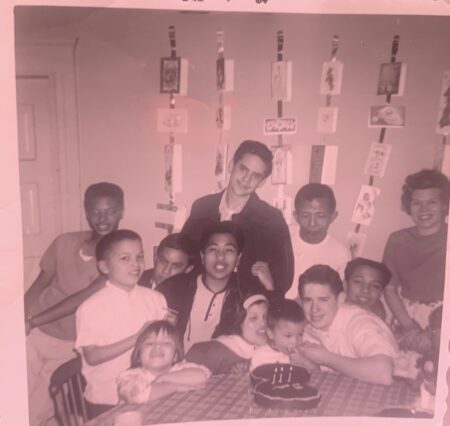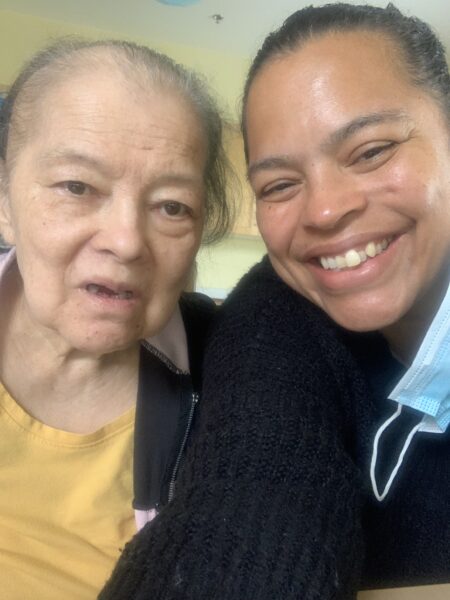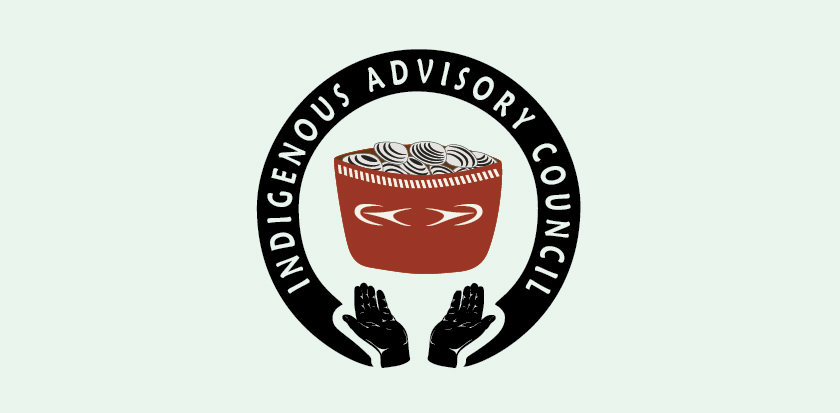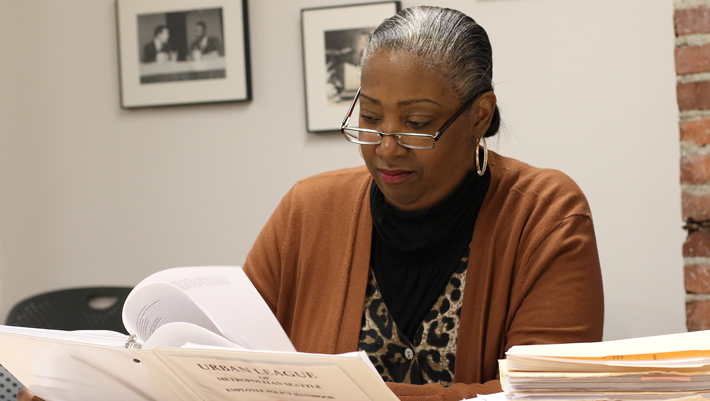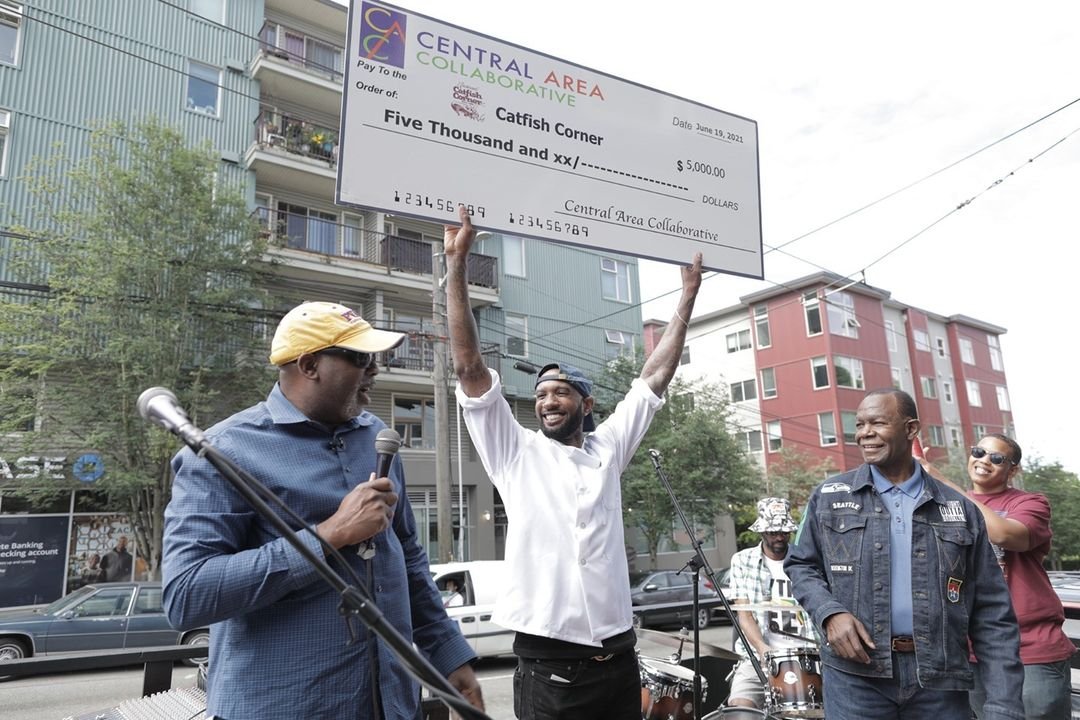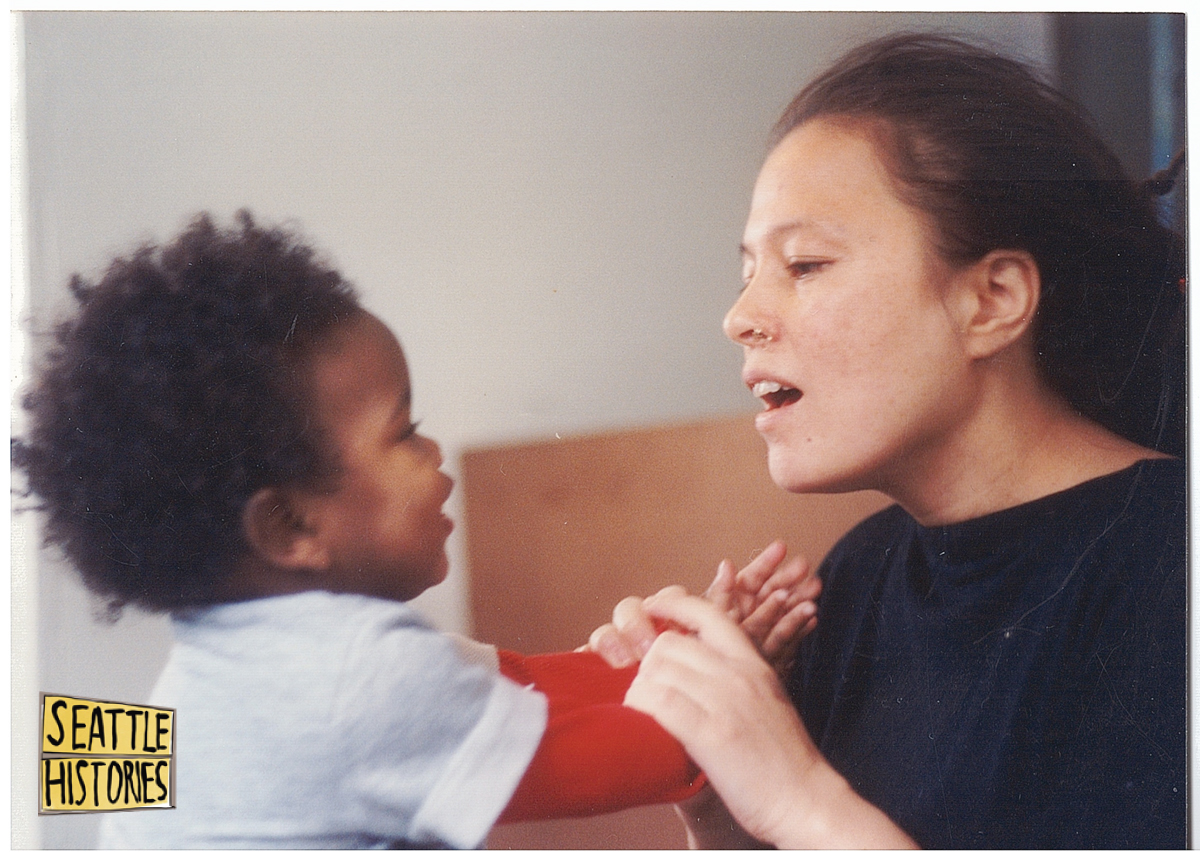
Historic preservation in Seattle begins with community. The Seattle Histories storytelling project highlights the places, people, and events that have shaped the history of Seattle’s communities. These stories, told by community members, emphasize experiences and narratives that may have been overlooked or misrepresented in our city. In honor of PRIDE month, we asked community members to submit stories specific to the history of Seattle’s LGBTQ+ community. Read the LGBTQ+ Seattle Histories stories and then delve into the full project.
I Really Do…A Pride Story
by Olisa Enrico
They were everything. When I was young, I imagined the feeling but didn’t quite reach the depth of the moment. They were all things. Love, hope, change, resistance, standing at the altar of commitment of “I will not do life without you”, of “we are legally family, now and until forever.” A life of “I choose you and you choose me” to be bound by ink like blood.
It is Her and it is Her. These women. My cousin and her life partner – her wife – were held close by family, friends, and community. They, them, both, one, covered their ground and spoke vows of responsibility through a veil of innocence and ignorance. They were queer and in love and legal.
LEGAL. Acknowledged. They planned to have children together, and both have rights of parenthood. They planned to build a life together. Invest blood, sweat, and tears into days, months, years until death are they parted.
My heart is almost fucking bursting. I am overcome and overwhelmed. It’s an honor to witness this moment. It was one where the memory files into “forever”.
My cousin’s vows slayed the soul: “I am honored to live this day and the rest of my days intertwined. Our life paths connected. I promise to listen. To take time to figure things out together. I remember when I saw you for the first time and knowing that you saw me. Not the surface of me but the soul of me, the flaws and the fortune and all things in between and you loved me. And I love you. I do.” I sit in awe of the couple of honor; two queer womxn – 21st-century existence. I really do. They were married.
When I was five years old, I stood witness to the marriage of my mother, Qi, a Filipino, Native, and white mother of four – gorgeous, talented, hippie, musician, lipstick lesbian. My mom is Goddess in my eyes. To be loved, revered, feared, and all things in between. I remember sitting in my mother’s lap. My hands on her hands as she played the piano. We sang and sang and danced in the kitchen. My mom, who was my everything, stood in front of a select group of chosen family in the Arboretum. We were way off in the corner where folks don’t really go. My mom and her bride Gusti Hanny, a femme/masc immigrant from Indonesia in the States on a student visa, overstayed.
My mom and her bride, bare feet and arms, skin dusted with gold, glittered in the sun. Shimmering bodies enveloped in gold-trimmed powder blue saris. Mom’s forehead crested in glittery goodness, chains with gems bridged the cheek from nose to ear, layers of fancy in the hippiest of ways. Gusti in a traditional hat that was more like a headband that was also a crown. They spoke poetry to one another. Their wrists were wrapped by the symbolic officiant. Gusti stepped on a raw egg and my mother washed her feet, together as they promised themselves to one another, before the goddess, before witness. But not before family. And not in view of society. They wouldn’t dare.
It was the early ‘80s. Like 1984/85. I remember back then. Capitol Hill is where the gays went to play cause there were a few spots that catered to out-and-proud folks. There was even a lesbian spot. The Wild Rose. I remember going there with my mom. She even got me a gig there when I was 9 years old. It was my first solo singing gig. The Hill. Pride parade and the festival, of course, at Volunteer Park. We went to all the things. That was special to the Hill. It was where we went as a family where Mom and Gusti were in community. We were in a community. We would go from festival to festival during the summers. I remember, in 1986, we went to the Michigan Womyn’s Festival. A field full of lesbians, mostly white ones, free to express themselves and show love. Safe from hate.
And the haters gonna hate. So much violence was perpetrated against out-and-proud people. Every week I would be at meetings with Mom and Gusti listening to them strategize and prophesize. That was around the time that the Q Patrol was formed in Seattle. The Q Patrol was a group of out and proud people that decided they were gonna do something about the violence. I remember my mom and her friends talking about the shift in energy and safety. And that’s why the circle that surrounded my mom and her bride in this sacred moment was so select.
Gusti grounded Mom. She balanced her out. She was practical. Mom was not. Mom liked expensive creams and makeup from I. Magnin on 5th Avenue. But we were broke. Like broke broke. They were so different and yet functioned in harmony. They were both artists, musicians, performers, designers, jewelry-making, and radical-thinking people. Gusti was younger than Mom by about a decade. But Mom was young in so many ways.
Mom had spent a lifetime caring for people. She was the oldest of 13 and moved out of her parent’s home when she got married to my dad. She spent 10 years married, caring for four children, an aging mother-in-law, and Uncle Jimmy. When she and my dad finally divorced after I was born, it was as if she shed the lies that she had been maintaining her whole life.
Mom was raised Catholic and went to Immaculate Conception from kindergarten through 8th grade. She was taught that divorce was a sin, being lesbian was a sin, her existence was sinful, and she did her best to conform to what the world expected her to be: a good wife, mother, and homemaker (in the hippiest of ways, of course). Mom and Dad were both creatives and threw the best parties, so I heard. As more children came, the dynamics shifted. Mom stopped drinking. Dad didn’t. And more children, and more responsibility, and more life. But Mom was raised Catholic, and divorce wasn’t an option.
When my gramma got divorced from my grandpa my mom opened her mind to the possibilities of shifting paths and perspectives. She was out and proud and scared and unashamed, but careful. There is risk to coming out.
Gramma Nancy disowned Mom when she came out. They didn’t talk for years when I was little. And then Gramma met Chuck and Chuck and Gramma got married and he became Pap Pap. Pap had a son who was out and proud. Gramma saw how Pap was able to love his son and have him sit next to her on the piano, as my mom did with her mom and with me. We started to go see Gramma occasionally after that. I guess I was around 8 years old.
My aunt was a lesbian too. Mom’s baby sister. But she never told Gramma. I remember going down to Portland to visit Auntie and her “friend” who she lived with. We knew they were together, but we were careful to never call Auntie’s partner her “girlfriend”. There is risk in being out.
I’ve only known my mother as a lesbian woman. She came out when I was one. My mom was beautiful, and women were infatuated. All types. The masc businesswoman who promised to put me through private school. The young Brazilian drummer who bought me ice cream on Broadway. The Black Native who laughed loud and screamed louder.
What was normal to me was strange to my sisters. I was the baby, but my sisters remember my mom being married to my dad, they remember Sunday dinner and family cookouts. Living in my Dad’s family home that his mother had bought as a Black Womxn in the 1950s. There was definitely an adjustment period for my sisters. To have this woman that Mom married be sitting in the position of “stepparent” was a schism in the oldest two. Though they loved Mom, you could feel the teenage rebellion to this mid-life lesbian excursion, or so they perceived it at first.
Gusti would try to scold them, and they would flip. Every one of my sisters got into a fistfight with Gusti at one point in time or another. She would be yelling “respect your mother” and they would call her “bitch” and atoms would split. They also grew to love and respect Gusti and appreciate her for all she did to ground Mom in love and creativity.
In the beginning though, when mom and Gusti got together, all my sisters were spread out like seeds. One at Gramma’s, one at Grampa’s, one at Dad’s. I had a Gusti. She was my other parent. She would wake me up in the morning “salamat pagi Olisa.” I would stretch and echo “salamat pagi Gusti.” She taught me children’s songs in Indonesian and how to count.
She taught me what she knew to be true and useful. She taught me the fundamentals of graphic design and photography. She showed me how to play guitar and write charts for the band. We would go to the old Kinkos on Broadway late at night and cut and paste fonts from printed materials, paste letters and logos from newspapers, and print posters for wheat pasting all around the city. We would go to Mekong and buy mung beans and chili paste. We would stop and get bahn mi for a dollar and catch the 7 p.m. bus back to the house.
In public, Gusti was my aunt. I was carefully instructed on the private/public function of this forbidden marriage. I didn’t talk about my family life at school. I didn’t share stories with teachers and friends. I grew fear around my classmates finding out. I became embarrassed of who my mother was. These poor hippie, musician, reggae-playing, loc-wearing, ganja-smoking, vegan lesbian women stood out.
We were all in a family band, playing rock and reggae around town. SASSYFRAS – the all-women reggae band led by lesbians playing with their four daughters and one son-in-law. People assumed a lot about us. Some would go as far as to make accusations that me and my sisters were lip-syncing and we were some kind of pretend band. But we played good music.
My school friends knew nothing about my life. I remember in middle school when I really got close with a group of girls. One by one I knew I was going to have to break it to them that my mom was a lesbian. We wanted to hang out outside of school. We had been friends since the third and fourth grade and finally, we were old enough to meet up and hang out at each other’s houses. I remember sitting in front of my friend Lisa who had been my friend for 4 years. And crying as I broke the news to her. I knew that the news could mean losing my friends. She gave me a hug and told me that it was ok. That it didn’t matter if my mom was a lesbian. My closest friends knew and that was all that mattered. There are risks to being out.
When I was sixteen or seventeen years old Gusti went back to Indonesia to take care of her mom because she was sick. We expected her to come back in a year or two, but Gusti got sick. She was diagnosed with breast cancer. Mom tried to get her back into the country for treatment. We had the best cancer treatment facilities right here in Seattle. But immigration said no. They weren’t actually married so they couldn’t use marriage as a reason to allow Gusti back in. Gusti had overstayed her student visa for a decade or more. Gusti died in Indonesia never having seen Mom again. Never having seen me again. I never said “turi makasi” for everything she gifted me as my stepmom, as my Gusti. I wonder if they had been able to be married the way my cousin is now, if she would still be alive.
My cousin is a beautiful and voluptuous bride. And I am honored to know that she is entering into this union in community, in love bound in ink, like blood.

